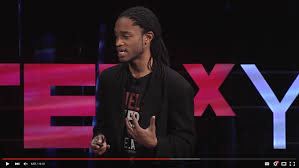College isn't just about graduation. Often many people have cliched the phrase "It's isn't about the end result, it's about the journey" and I totally agree. I have been told over and over again that while I'm in college, take advantage of everything that it has to offer before my time is up. This included scoping out the clubs, sports, and activities outside of class. Engage in those activities.
In class Wednesday, we talked about how important it is to engage in the classroom but also everything else happening around you. Find a club or sport that interests you, because not only is it fun, it can help you figure out your career path or decorate your resume (if it applies to a related field of study). We also watched a TEDx talk about how acquiring a substantially successful career is getting increasingly difficult and more higher-educational degrees are required to apply for a surface-level job than in the past. This is what makes those experiences and internships so valuable in college because now they are almost required for work outside of college.

There are plenty of activities happening at this University. It really is rather difficult to walk by a booth set up in the RAC or Russel Union and not get magically roped into conversation with the promoters of that booth. I am basically saying it seems like one would have to try really hard not to join an extracurricular activity of some sort, especially if the club hands out free donuts!
I had been climbing for 6 months in a bouldering gym in Athens called Active Climbing and I have really grown to enjoy the sport. It is like solving a puzzle but with physical strength and technique interwoven into the puzzle, finding the routes to the top, determining which hand/foot position will bring you closer to your goal, and of course being able to hold on to the wall with just your finger tips. Try hanging on to the top of your door frame and timing it. See how long you can hold? When I finally get settled here at Georgia Southern, I intend to seek out their climbing club and join.
Back to school. My goal is to graduate with a degree in Electrical Engineering and some experience under my belt. I know the classes for this pathway are not easy and there are multiple resources that can help if struggle arises. Tutoring and academic advisement can help lead a student in the right direction when they need help. Much more information about academics, clubs, sports, and facilities can be found at the campus resources page on the Georgia Southern website. By using these resources adequately, students can achieve their goals much quicker and easier, and engage in extracurricular activities, relieving some of that college-induced stress.
The big take-away of this post is that it seems like engaging in a club or sport of interest is vital to your personal well-being. Even if it doesn't apply to your resume, it will make your life at college less stressful.
Resources
Jullien Gordon TEDx - https://www.youtube.com/watch?v=29tJAgc54RA
Active Climbing - https://www.activeclimbing.com/athens
Campus Resources - https://academics.georgiasouthern.edu/fye/students/first-year/on-campus-resources/
In class Wednesday, we talked about how important it is to engage in the classroom but also everything else happening around you. Find a club or sport that interests you, because not only is it fun, it can help you figure out your career path or decorate your resume (if it applies to a related field of study). We also watched a TEDx talk about how acquiring a substantially successful career is getting increasingly difficult and more higher-educational degrees are required to apply for a surface-level job than in the past. This is what makes those experiences and internships so valuable in college because now they are almost required for work outside of college.
There are plenty of activities happening at this University. It really is rather difficult to walk by a booth set up in the RAC or Russel Union and not get magically roped into conversation with the promoters of that booth. I am basically saying it seems like one would have to try really hard not to join an extracurricular activity of some sort, especially if the club hands out free donuts!
I had been climbing for 6 months in a bouldering gym in Athens called Active Climbing and I have really grown to enjoy the sport. It is like solving a puzzle but with physical strength and technique interwoven into the puzzle, finding the routes to the top, determining which hand/foot position will bring you closer to your goal, and of course being able to hold on to the wall with just your finger tips. Try hanging on to the top of your door frame and timing it. See how long you can hold? When I finally get settled here at Georgia Southern, I intend to seek out their climbing club and join.
Back to school. My goal is to graduate with a degree in Electrical Engineering and some experience under my belt. I know the classes for this pathway are not easy and there are multiple resources that can help if struggle arises. Tutoring and academic advisement can help lead a student in the right direction when they need help. Much more information about academics, clubs, sports, and facilities can be found at the campus resources page on the Georgia Southern website. By using these resources adequately, students can achieve their goals much quicker and easier, and engage in extracurricular activities, relieving some of that college-induced stress.
The big take-away of this post is that it seems like engaging in a club or sport of interest is vital to your personal well-being. Even if it doesn't apply to your resume, it will make your life at college less stressful.
Resources
Jullien Gordon TEDx - https://www.youtube.com/watch?v=29tJAgc54RA
Active Climbing - https://www.activeclimbing.com/athens
Campus Resources - https://academics.georgiasouthern.edu/fye/students/first-year/on-campus-resources/

Comments
Post a Comment